弟子规(中英文对照)
弟子规英语翻译
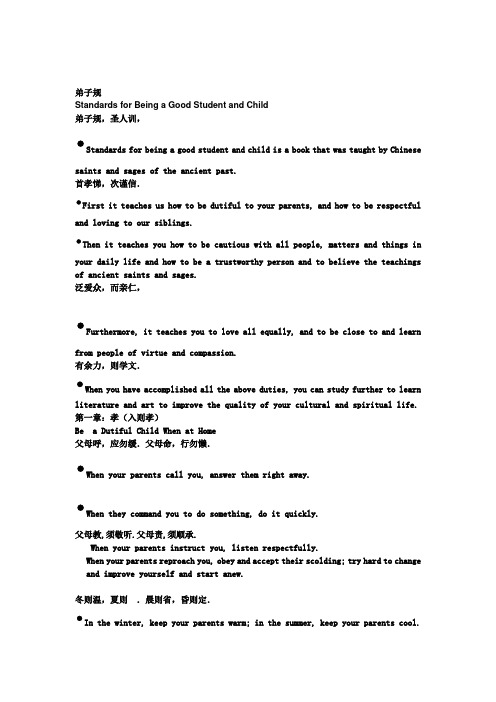
弟子规Standards for Being a Good Student and Child弟子规,圣人训,•Standards for being a good student and child is a book that was taught by Chinesesaints and sages of the ancient past.首孝悌,次谨信.•First it teaches us how to be dutiful to your parents, and how to be respectfuland loving to our siblings.•Then it teaches you how to be cautious with all people, matters and things inyour daily life and how to be a trustworthy person and to believe the teachings of ancient saints and sages.泛爱众,而亲仁,•Furthermore, it teaches you to love all equally, and to be close to and learnfrom people of virtue and compassion.有余力,则学文.•When you have accomplished all the above duties, you can study further to learn literature and art to improve the quality of your cultural and spiritual life. 第一章:孝(入则孝)Be a Dutiful Child When at Home父母呼,应勿缓.父母命,行勿懒.•When your parents call you, answer them right away.•When they command you to do something, do it quickly.父母教,须敬听.父母责,须顺承.When your parents instruct you, listen respectfully.When your parents reproach you, obey and accept their scolding; try hard to change and improve yourself and start anew.冬则温,夏则.晨则省,昏则定.•In the winter, keep your parents warm; in the summer, keep your parents cool.rest well.出必告,返必面.•Before going out, tell your parents where you are going, for parents are always concerned about their children.•After returning home, go and see your parents to let them know you are back, so they don’t worry about you.居有常,业无变.•Have a permanent place to stay and lead a routine life. •Persist in whatever you do and do not change your aspirations at will.亲所好,力为具,亲所恶,谨为去.•If whatever please your parents is fair and reasonable, try your best to get it for them.•Should something displease your parents, if within reason, cautiously keep it away from them.身有伤,贻亲忧,德有伤,贻亲羞.•When your body is hurt, your parents will be worried.•If your virtues are compromised, your parents will feel ashamed.亲爱我,孝何难,亲恶我,孝方贤.•When you have loving parents, it is not difficult to be a dutiful child. •But if you are still dutiful to parents who hate you, you will meet the standards of the saints and sages for being a dutiful child.亲有过,谏使更,怡吾色,柔吾声.•When your parents do wrong, urge them to change.•Do it with a kind facial expression and a warm gentle voice.谏不入,悦复谏,号泣随,挞无怨.you dissuade them again, followed by crying to make them understand why. •If they end up whipping you, do not hold a grudge against them.亲有疾,药先尝,昼夜侍,不离床.•When your parents are ill, taste the medicine first before giving it to them. •Take care of them night and day, do not leave their bedside.丧三年,常悲咽,居处变,酒肉绝.•During the first three years of mourning after they passed away, remember them with gratitude and feel sad often for not being able to repay them for their kindness in bringing you up.•During this period, you should arrange your home to reflect your grief and sorrow. Avoid festivities and indulgence in food and alcoholic drinks.丧尽礼,祭尽诚,事死者,如事生.•Observe the proper etiquette in arranging their funerals. Hold the memorial ceremony and commemorate their anniversaries with your utmost sincerity. •Serve your departed parents as if they were still alive.第二章:悌(出则悌)Standards for a Younger Brother When Away from Home兄道友,弟道恭,兄弟睦,孝在中•Older siblings should befriend the younger ones. Younger siblings should respect and love the older ones.•Siblings who keep harmonious relationships among themselves are being dutiful to their parents.财物轻,怨何生,言语忍,忿自泯.•When siblings value their ties more than property and belongings, no resentment will grow among them.•When siblings are careful with words and hold back hurtful comments, feelings of anger naturally die out.或饮食,或坐走,长者先,幼者后.younger ones should follow.长呼人,即代叫,人不在,几即到.•When the elder is asking for someone, get that person for him right away. •If you cannot find that person, immediately report back, and put yourself at the elder’s service instead.称尊长,勿呼名,对尊长,勿见能.•When you address an elder, do not call him by his “given name”.•In front of an elder, do not show off.路遇长,疾趋揖,长无言,退恭立.•If you come across an elder you know on the street, promptly clasp your hands and greet him with a bow.•If he does not speak to you, step back and respectfully stand aside.骑下马,乘下车,过犹待,百步余.•Should you be riding on a horse and you spot an elder you know walking, you should dismount and pay respect to the elder.•If you are riding in a carriage, you should stop, get out of the carriage, and ask if you can give him a ride.•If you meet an elder passing by, you should stand aside and wait respectfully; do not leave until you can no longer see him.长者立,幼勿坐,长者坐,命乃坐.•When an elder is standing, do not sit.•After the elder sits down, take a seat only after you are told to do so. 尊长前,声要低,低不闻,却非宜.•But if your voice is too low and hard to hear, it is not appropriate.进必趋,退必迟,问起对,视勿移.•When meeting an elder, walking briskly towards him.•When leaving, do not exit in a haste.•When answering a question, look at the person who is asking you the question. 事诸父,如事父,事诸兄,如事兄.•Serve your uncles as if you were serving your parents.•Treat your cousins as if they were your own siblings.第三章:谨(谨而信)Be Cautious in Your Daily Life朝起早,夜眠迟,老易至,惜此时.•Get up early in the morning before your parents. Go to bed at night only afterthey have gone to sleep.•When you realize that time is passing you by and cannot be turned back, and that you are getting older year by year, you will especially treasure the present moment. 晨必盥,兼漱口,便溺回,辄净手.•When you get up in the morning, wash your face and brush your teeth. •After using the toilet, always wash your hands.冠必正,纽必结,袜与履,俱紧切.•You must wear your hat straight, and make sure the hooks of your clothes are tied. •Make sure socks and shoes are worn neatly and correctly.置冠服,有定位,勿乱顿,致污秽.•Place your hat and clothes away in proper places.•Do not carelessly throw your clothes around, for that will get them dirty. 衣贵洁,不贵华,上循分,下称家.•It is more important that your clothes are clean, rather than how extravagant they are.•Wear what is suitable for your station and wear clothes according to your family traditions and customs.对饮食,勿拣择,食适可,勿过则.•When it comes to eating and drinking, do not pick and choose your food. •Eat only the right amount; do not overeat.年方少,勿饮酒,饮酒醉,最为丑.•You are still too young, so do not drink alcohol.•When you are drunk, your behavior will turn ugly.步从容,立端正,揖深圆,拜恭敬.•Walk composed, with light and even steps.•Stand up straight and tall.•Your bows should be deep with hands held in front and arms rounded. Always pay your respect with reverence.勿践阈,勿跛倚,勿箕踞,勿摇髀.•Do not step on doorsills.•Do not stand leaning on one leg.•Do not sit with your legs apart or sprawled out.•Do not rock the lower part of your body while sitting down.缓揭帘,勿有声,宽转弯,勿触棱.•Lift the curtain slowly, do not make a sound.执虚器,如执盈,入虚室,如有人.•Hold carefully the empty containers as if they were full. •Enter empty rooms as if they were occupied.将入门.问孰存,将上堂,声必扬.•When you are about to enter a main entrance, ask if someone is inside. •Before entering a room, make yourself heard, so that those inside know someone is approaching.人问谁,对以名,吾与我,不分明.•If someone asks who you are, give your name.•To answer “It’s me” or “me” is not clear.用人物,须明求,倘不问,即为偷.•Before borrowing things from others, you must ask for permission. If you do notask, it is stealing.借人物,及时还,后有急,借不难.•When borrowing things from others, you should return them promptly. •Later on, when you have an urgent need, you will not have a problem borrowing from them again.第四章:信Be Trustworthy凡出言,信为先,诈与妄,奚可焉.•When you speak, honesty is important.•Deceitful words and lies are not allowed.话说多,不如少,惟其是,勿佞巧.•Speak the truth; do not twist the fact.奸巧语,秽污词,市井气,切戒之.•Cunning words, foul language and bad habits must be avoided at all costs. 见未真,勿轻言,知未的,勿轻传.•What you have not seen with your own eyes, do not readily tell to others. •What you do not know for sure, do not readily pass to others.事非宜,勿轻诺,苟轻诺,进退错.•When asked to do something that is inappropriate, do not promise lightly. •If you do, you will be wrong either way.凡道字,重且舒,勿急疾,勿模糊.•When speaking, make the words clear and to the point.•Do not talk too fast or mumble.彼说长,此说短,不关己,莫闲管.•Some like to talk about the good points of others while some like to talk about the faults of others.•If it is none of your business, do not get involved.见人善,即思齐,纵去远,以渐跻.•When you see others do good deeds, think about following their example. •Even though your own achievements are still far behind those of others, you are getting closer.见人恶,既内省,有则改,无加警.•When you see others do wrong, immediately reflect upon yourself.make the same mistake.唯德学,唯才艺,不如人,当自砺.•When your morals, conduct, knowledge, and skills are not as good as others, youshould encourage yourself to be better.若衣服,若饮食,不如人,勿生戚.•If the clothes you wear or the food you eat and drink are not as good as others,do not be ashamed.闻过怒,闻誉乐,损友来,益友却.•If criticism makes you angry, and compliments make you happy, bad company willcome your way and good friends will shy away.闻誉恐,闻过欣,直谅士,渐相亲.•If you are uneasy about compliments and appreciative of criticism, sincere and understanding virtuous people will gradually get close to you.无心非,名为错,有心非,名为恶.•If your mistake is not done on purpose, it is only an error. If it is done onpurpose, it is evil.过能改,归于无,倘掩饰,增一辜.•If you correct your mistake and do not repeat it, you no longer have the mistake. •If you try to cover it up, you will be doubly wrong.第五章:泛爱众Love All Equally凡是人,皆须爱,天同覆,地同载.•Human beings, regardless of nationality, race, or religion, should be loved equally.•We are all sheltered by the same sky and we all live on the same planet Earth. 行高者,名自高,人所重,非貌高.•What people value is not based on outside appearance. (One’s outstanding ability will naturally honor him.)才大者,望自大,人所服,非言大.•A person’s outstanding ability will naturally honor him with a good reputation.•Admiration from others does not come from boasting or praising oneself.己有能,勿自私,人所能,勿轻訾.If you are a very capable person, use your abilities for the benefit of others.Other people’s competence should not be slandered.勿谄富,勿骄贫,勿厌故,勿喜新.•Do not flatter the rich or despise the poor.•Do not ignore old friends and take delight in the new ones.人有短,切莫揭,人有私,切莫说.•If a person has a shortcoming, do not expose it.•If a person has a secret, do not tell others.道人善,即是善,人知之,愈思勉.•Praising the goodness of others is a good deed in itself.•When people approve of or praise you, you should feel encouraged and try even harder.扬人恶,即是恶,疾之甚,祸且作.•Spreading rumors about the wrongdoings of others is a wrongdoing in itself. •When the harm done has reached the extreme, misfortunes will surely follow. 善相劝,德皆建,过不规,道两亏.•When encouraging each other to do good, the virtues of both are built up. •If you do not tell others of their faults, you will both be wrong.凡取与,贵分晓,与宜多,取宜少.•It is better to give more and take less.将加人,先问己,己不欲,即速已.•What you ask others to do, first ask yourself if you will do it.•If it is not something you will do, do not ask others to do it.恩欲报,怨欲忘,抱怨短,报恩长.•You must repay the kindness of others and let go of your resentments. •Spending less time holding grudges and more time paying back the kindness of others.待奴,身贵端,虽贵端,慈而宽.•When you are directing maids and servants, you should be respectable and dignified.•Even though you are respectable and dignified, treat them kindly and generously. 势服人,心不然,理服人,方无言.•If you use your influence to make them submissive, their hearts will never be with you.•If you can convince them with sound reasoning, they will then have nothing more to say.第六章:亲仁Be Close to and Learn from People of Virtue and Compassion同是人,类不齐,流俗众,仁者稀.•We are all humans, but we are not the same.•Most of us are ordinary. Only a few have great virtues and high moral principles. 果仁者,人多畏,言不讳,色不媚.•A truly virtuous person is greatly respected by others.•He will not be afraid to speak the truth and he will not fawn on others. 能亲仁,无限好,德日进,过日少.•If you are close to and learn from people of great virtue and compassion, you will benefit immensely.不亲仁,无限害,小人进,百事坏.•If you are not close to and learn from people of great virtue, you will suffer a great loss.•People without virtue will get close to you and nothing you do will succeed. 第七章:余力学文After all the above are accomplished, study further and learn literature and art to improve your culture and spiritual life.不力行,但学文,长浮华,成何人.•If you do not actively make use of what you have learned, but continue to study on the surface, your knowledge is increasing, but it is only superficial. What kind of person will you be?但力行,不学文,任己见,昧理真.•If you do apply your knowledge diligently, but stop studying, you will only do things based on your own opinion, thinking it is correct. In fact, what you know is not the truth.读书法,有三到,心眼口,信皆要.•There are methods to study correctly. They involve concentration in three areas: your mind, your eyes and your mouth. To believe in what you read is equally important. 方读此,勿慕彼,此未终,彼勿起.•When you begin to read a book, do not think about another.•If you have not completed the book, do not start another.宽为限,紧用功,工夫到,滞塞通.•Give yourself a lot of time to study and study hard.•Given time and effort, you will thoroughly understand what you read.心有疑,随札记,就人问,求确义.•If you have a question, make a note of it.•Ask the person who has the knowledge for the right answer.房室清,墙壁净,几案洁,笔砚正.•Keep your room neat, your walls uncluttered and clean, your desk tidy and yourbrush and inkstone properly placed.墨磨偏,心不端,字不敬,心先病.•If your inkblock is ground unevenly, it shows you have a poor state of mind.•When word are written carelessly, showing no respect, it shows your state of mind has not been well.列典籍,有定处,读看毕,还原处.•The books should be classified, placed on the book shelves, and in their proper places.•After you finish reading a book, put it back in its right place.虽有急,卷束齐,有缺损,就补之.•Even though you are in a hurry, neatly roll up and bind the open bamboo scroll you were reading.•Any missing or damaged pages are to be repaired.非圣书,屏勿视,蔽聪明,坏心志.•If it is not a book on the teachings of the saints and sages, it should be discarded and not even be looked at.•These books can block your intelligence and wisdom, and will undermine your aspirations and sense of direction.勿自暴,勿自弃,圣与贤,可驯致.•Neither be harsh on yourself, nor give up on yourself.•To be a person of high ideals, moral standards and virtue is something we can all attain in time。
弟子规译文对照
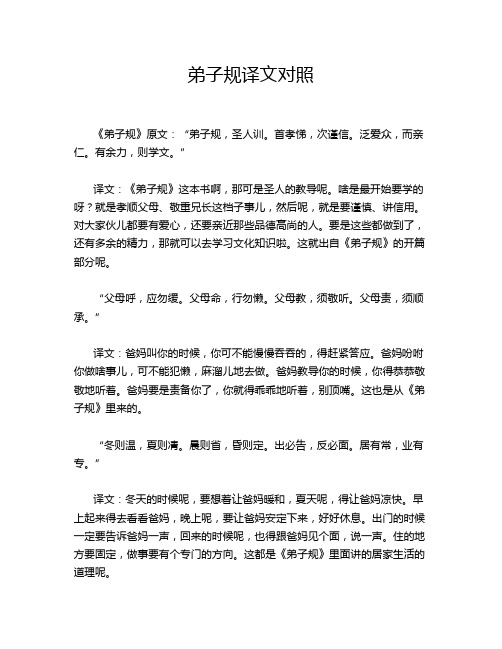
弟子规译文对照《弟子规》原文:“弟子规,圣人训。
首孝悌,次谨信。
泛爱众,而亲仁。
有余力,则学文。
”译文:《弟子规》这本书啊,那可是圣人的教导呢。
啥是最开始要学的呀?就是孝顺父母、敬重兄长这档子事儿,然后呢,就是要谨慎、讲信用。
对大家伙儿都要有爱心,还要亲近那些品德高尚的人。
要是这些都做到了,还有多余的精力,那就可以去学习文化知识啦。
这就出自《弟子规》的开篇部分呢。
“父母呼,应勿缓。
父母命,行勿懒。
父母教,须敬听。
父母责,须顺承。
”译文:爸妈叫你的时候,你可不能慢慢吞吞的,得赶紧答应。
爸妈吩咐你做啥事儿,可不能犯懒,麻溜儿地去做。
爸妈教导你的时候,你得恭恭敬敬地听着。
爸妈要是责备你了,你就得乖乖地听着,别顶嘴。
这也是从《弟子规》里来的。
“冬则温,夏则凊。
晨则省,昏则定。
出必告,反必面。
居有常,业有专。
”译文:冬天的时候呢,要想着让爸妈暖和,夏天呢,得让爸妈凉快。
早上起来得去看看爸妈,晚上呢,要让爸妈安定下来,好好休息。
出门的时候一定要告诉爸妈一声,回来的时候呢,也得跟爸妈见个面,说一声。
住的地方要固定,做事要有个专门的方向。
这都是《弟子规》里面讲的居家生活的道理呢。
“事虽小,勿擅为。
苟擅为,子道亏。
物虽小,勿私藏。
苟私藏,亲心伤。
”译文:哪怕是小事儿,也别自作主张就去做。
要是你自作主张做了,那就是做子女的没尽到本分。
东西就算是小物件,也别偷偷藏起来。
要是偷偷藏起来了,爸妈心里得多难受啊。
这都是《弟子规》里面告诉我们为人子女该遵守的一些事儿呢。
“亲所好,力为具。
亲所恶,谨为去。
身有伤,贻亲忧。
德有伤,贻亲羞。
”译文:爸妈喜欢的东西,你得尽力给他们弄来。
爸妈讨厌的东西呢,你得小心地去掉。
要是自己身体受伤了,就会让爸妈担心。
要是品德上有毛病了,就会让爸妈觉得丢人。
这都是《弟子规》教给我们的为人子女的道理,真的是很实用的呢。
“亲爱我,孝何难。
亲憎我,孝方贤。
亲有过,谏使更。
怡吾色,柔吾声。
谏不入,悦复谏。
《弟子规》中英文对照
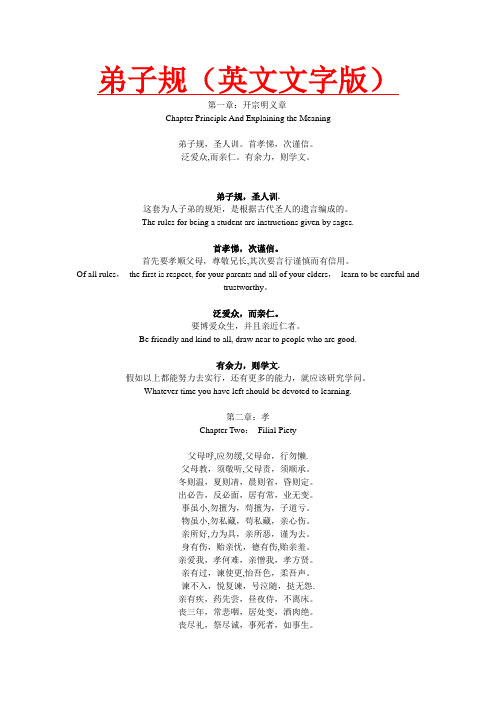
弟子规(英文文字版)第一章:开宗明义章Chapter Principle And Explaining the Meaning弟子规,圣人训。
首孝悌,次谨信。
泛爱众,而亲仁。
有余力,则学文。
弟子规,圣人训.这套为人子弟的规矩,是根据古代圣人的遗言编成的。
The rules for being a student are instructions given by sages.首孝悌,次谨信。
首先要孝顺父母,尊敬兄长,其次要言行谨慎而有信用。
Of all rules,the first is respect, for your parents and all of your elders,learn to be careful andtrustworthy。
泛爱众,而亲仁。
要博爱众生,并且亲近仁者。
Be friendly and kind to all, draw near to people who are good.有余力,则学文.假如以上都能努力去实行,还有更多的能力,就应该研究学问。
Whatever time you have left should be devoted to learning.第二章:孝Chapter Two:Filial Piety父母呼,应勿缓,父母命,行勿懒.父母教,须敬听,父母责,须顺承。
冬则温,夏则凊,晨则省,昏则定。
出必告,反必面,居有常,业无变。
事虽小,勿擅为,苟擅为,子道亏。
物虽小,勿私藏,苟私藏,亲心伤。
亲所好,力为具,亲所恶,谨为去。
身有伤,贻亲忧,德有伤,贻亲羞。
亲爱我,孝何难,亲憎我,孝方贤。
亲有过,谏使更,怡吾色,柔吾声。
谏不入,悦复谏,号泣随,挞无怨.亲有疾,药先尝,昼夜侍,不离床。
丧三年,常悲咽,居处变,酒肉绝。
丧尽礼,祭尽诚,事死者,如事生。
父母呼,应勿缓,父母呼唤我们时,马上回答,不要迟缓.When father and mother are calling, answer them right away。
《弟子规》全文注音版带白话翻译(A4可打印)
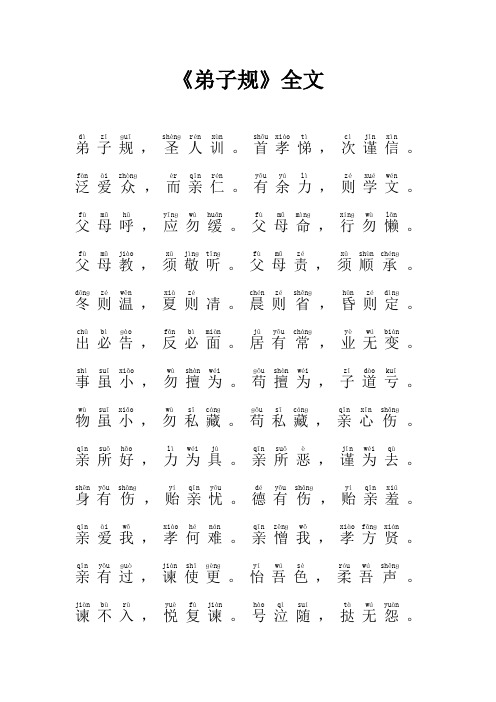
《弟子规》全文弟dì子zǐ规ɡuī,圣shènɡ人rén训xùn。
首shǒu 孝xiào悌tì,次cì谨jǐn信xìn。
泛fàn爱ài众zhònɡ,而ér亲qīn仁rén。
有yǒu余yú力lì,则zé学xué文wén。
父fù母mǔ呼hū,应yīnɡ勿wù缓huǎn。
父fù母mǔ命mìnɡ,行xínɡ勿wù懒lǎn。
父fù母mǔ教jiào,须xū敬jìnɡ听tīnɡ。
父fù母mǔ责zé,须xū顺shùn 承chénɡ。
冬dōnɡ则zé温wēn,夏xià则zé凊。
晨chén则zé省shěnɡ,昏hūn则zé定dìnɡ。
出chū必bì告ɡào,反fǎn必bì面miàn。
居jū有yǒu常chánɡ,业yè无wú变biàn。
事shì虽suī小xiǎo,勿wù擅shàn为wéi。
苟ɡǒu擅shàn为wéi,子zǐ道dào亏kuī。
物wù虽suī小xiǎo,勿wù私sī藏cánɡ。
苟ɡǒu私sī藏cánɡ,亲qīn心xīn伤shānɡ。
亲qīn所suǒ好hǎo,力lì为wéi具jù。
亲qīn所suǒ恶è,谨jǐn为wéi去qù。
身shēn有yǒu伤shānɡ,贻yí亲qīn忧yōu。
弟子规中英对照

弟子规圣人训首孝弟次谨信泛爱众而亲仁有余力则学文〈入则孝〉父母呼应勿缓父母命行勿懒父母教须敬听父母责须顺承冬则温夏则凊晨则省昏则定出必告反必面居有常业无变事虽小勿擅为苟擅为子道亏物虽小勿私藏苟私藏亲心伤亲所好力为具亲所恶谨为去身有伤贻亲忧德有伤贻亲羞亲爱我孝何难亲憎我孝方贤亲有过谏使更怡吾色柔吾声谏不入悦复谏号泣随挞无怨亲有疾药先尝昼夜侍不离床丧三年常悲咽居处变酒肉绝丧尽礼祭尽诚事死者如事生〈出则弟〉兄道友弟道恭兄弟睦孝在中财物轻怨何生言语忍忿自泯或饮食或坐走长者先幼者后长呼人即代叫人不在己即到称尊长勿呼名对尊长勿见能路遇长疾趋揖长无言退恭立骑下马乘下车过犹待百步余长者立幼勿坐长者坐命乃坐尊长前声要低低不闻却非宜近必趋退必迟问起对视勿移事诸父如事父事诸兄如事兄<谨〉朝起早夜眠迟老易至惜此时晨必盥兼漱口便溺回辄净手冠必正纽必结袜与履俱紧切置冠服有定位勿乱顿致污秽衣贵洁不贵华上循分下称家对饮食勿拣择食适可勿过则年方少勿饮酒饮酒醉最为丑步从容立端正揖深圆拜恭敬勿践阈勿跛倚勿箕踞勿摇髀缓揭帘勿有声宽转弯勿触棱执虚器如执盈入虚室如有人事勿忙忙多错勿畏难勿轻略斗闹场绝勿近邪僻事绝勿问将入门问孰存将上堂声必扬人问谁对以名吾与我不分明用人物须明求倘不问即为偷借人物及时还后有急借不难〈信〉凡出言信为先诈与妄奚可焉话说多不如少惟其是勿佞巧奸巧语秽污词市井气切戒之见未真勿轻言知未的勿轻传事非宜勿轻诺苟轻诺进退错凡道字重且舒勿急疾勿模糊彼说长此说短不关己莫闲管见人善即思齐纵去远以渐跻见人恶即内省有则改无加警唯德学唯才艺不如人当自砺若衣服若饮食不如人勿生戚闻过怒闻誉乐损友来益友却闻誉恐闻过欣直谅士渐相亲无心非名为错有心非名为恶过能改归于无倘掩饰增一辜凡是人皆须爱天同覆地同载行高者名自高人所重非貌高才大者望自大人所服非言大己有能勿自私人所能勿轻訾勿谄富勿骄贫勿厌故勿喜新人不闲勿事搅人不安勿话扰人有短切莫揭人有私切莫说道人善即是善人知之愈思勉扬人恶既是恶疾之甚祸且作善相劝德皆建过不规道两亏凡取与贵分晓与宜多取宜少将加人先问己己不欲即速已恩欲报怨欲忘报怨短报恩长待婢仆身贵端虽贵端慈而宽势服人心不然理服人方无言〈亲仁〉同是人类不齐流俗众仁者希果仁者人多畏言不讳色不媚能亲仁无限好德日进过日少不亲仁无限害小人进百事坏〈余力学文〉不力行但学文长浮华成何人但力行不学文任己见昧理真读书法有三到心眼口信皆要方读此勿慕彼此未终彼勿起宽为限紧用功工夫到滞塞通心有疑随札记就人问求确义房室清墙壁净几案洁笔砚正墨磨偏心不端字不敬心先病列典籍有定处读看毕还原处虽有急卷束齐有缺坏就补之非圣书屏勿视敝聪明坏心志勿自暴勿自弃圣与贤可驯致<总叙>弟子规圣人训首孝弟次谨信Di Zi Gui or standards for Being a Good Student and child is a book that was taught by Chinese saints and sages of the ancient past. The book first teaches us how to be dutiful to our parents, and how to be respectful and loving to our siblings. It then teaches us how to be cautious with all people, matters, and objects in our daily lives; how to be a trustworthy person; and to believe in the teachings of the ancient saints and sages.弟子规是中国古圣先贤的教诲。
《弟子规》(谨篇)——中英文双语含释义
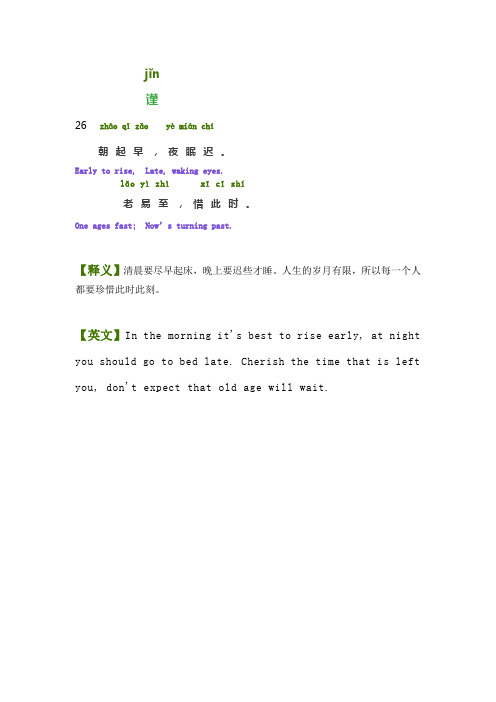
jǐn谨26zhāo qǐ zǎo yè mián chí朝起早,夜眠迟。
Early to rise, Late, waking eyes.lǎo yì zhìxī cǐ shí老易至,惜此时。
One ages fast; Now’s turning past.【释义】清晨要尽早起床,晚上要迟些才睡。
人生的岁月有限,所以每一个人都要珍惜此时此刻。
【英文】In the morning it's best to rise early, at night you should go to bed late. Cherish the time that is left you, don't expect that old age will wait.谨27chén bì guàn jiān shù kǒu晨必盥,兼漱口。
A morning bath, A cleaned mouth.biàn niào huí zhé jìng shǒu便尿回,辄净手。
At th’ toilet stand,Wash your hand.【释义】早晨一定要洗脸漱口。
大小便完后,要洗手。
【英文】First wash your face after rising, and next brush your teeth very well. After you go to the toilet, use water and soap on your hands.谨28guān bì zhèng niǔ bì jié冠必正,纽必结。
Being capped right,And buttoned tight.wà yǔ lǚ jù jǐn qiè袜与履,俱紧切。
弟子规(中英文对照)
弟子规(中英文对照)英文弟子规《弟子规》原名《训蒙文》,为清朝康熙年间秀才李毓秀所作,其内容采用《论语》“学而篇”第六条“弟子,入则孝,出则悌,谨而信,泛爱众,而亲仁,行有余力,则以学文”的文义,列述弟子在家、外出、接物、待人与学习上应该恪守的守则规范。
其中“弟子”的理解可以与时俱进。
在家指孩子;在学校指学生;在公司指员工;在单位指下级;在社会,指公民。
《弟子规》是集中国传统家训、家规、家教之大成,被誉为人生第一规,是做人之根本。
As one of the most popular primers in China, Guidelines for Children (Dizi Gui) was written by Li Yuxiu in the Qing Dynasty during the reign of the Kangxi Emperor (1661-1722). It is based on the ancient teaching of the Chinese philosopher Confucius that emphasizes the basic requisites for being a good person and guidelines for living in harmony with people. The Chinese version was written in three-character verses for the sake of smooth reading. To keep the original style, the English translation is also written in three-word verses without the loss of content, in order to help the English readers not only understand the text but also capture the essence of Chinese civilization that belongs both to China and to the whole world.Children should abideBy Confucius’ guide:Respect elders ’n parent;Be trustworthy 'n prudent.【释义】《弟子规》这本书是孔子对学生的生活规范。
弟子规原文及翻译
弟子规原文及翻译弟子规原文及翻译《弟子规》这本书,是依据至圣先师孔子的教诲而编成的生活规范。
首先在日常生活中,要做到孝顺父母,友爱兄弟姐妹。
其次在一切日常生活言语行为中要小心谨慎,要讲信用。
以下是小编收集整理了弟子规原文及翻译,供大家参考借鉴,希望可以帮助到有需要的朋友。
一、《弟子规》总叙(原文及译文)【原文】:弟子规,圣人训。
首孝悌,次谨信。
泛爱众,而亲仁。
有余力,则学文。
【译文】:弟子就是学生,规是规范。
《弟子规》是依据至圣先师孔子的教诲而编成的生活规范,它规定了学生主修的六门课和辅修的一门课。
首先在日常生活中,要做到孝顺父母,友爱兄弟姐妹。
其次在一切日常生活中行为要小心谨慎,言语要讲信用。
和大众相处到平等博爱,并且亲近有仁德的人,向他学习,这些都是很重要非做不可的事。
如果做了之后,还有多余的时间精力,就应该好好的学习六艺等其它有益的学问。
二、《弟子规》入则孝(原文及译文)《弟子规》“入则孝”是学生主修的第一门课。
入是在家。
孝是善事父母,就是在家要善事父母。
善事,一个是心,一个是侍。
心即是心里面念念不忘父母对我们的养育之恩,侍即是念念都要照顾到父母。
我们能以这样的心去做,就是善事父母,这是做人的根本。
百善孝当先。
父母呼应勿缓父母命行勿懒父母教须敬听父母责须顺承冬则温夏则凊晨则省昏则定【译文】:父母亲叫你的时候,要立刻答应,不能迟缓;父母亲让你做事的时候,要马上去做,不能拖延偷懒。
对父母的教诲,要恭敬地聆听;对父母的责备,要顺从地接受。
子女照料父母,冬天要让他们温暖,夏天要让他们清爽凉快。
早晨要向父母请安。
晚上要替他们铺好被子;伺候父母安眠。
出必告反必面居有常业无变事虽小勿擅为苟擅为子道亏物虽小勿私藏苟私藏亲心伤亲所好力为具亲所恶谨为去【译文】:出门要告诉父母一声,回来也要通报一声,以免父母挂念。
平时居住的地方要固定,选定的职业或立定的志向要努力去完成,不要轻易改变。
不要因为小事情,就不禀告父母而擅自去做。
《弟子规》诗词英译
《弟子规》诗词英译《弟子规》诗词英译父母呼,应勿缓。
父母命,行勿懒。
When your parents call you,You should answer without delay.When your parents ask you to do something,You should act immediately as your parents say.父母教,须敬听。
父母责,须顺承。
When your parents instruct you,You must listen to them respectfully.When your parents rebuke you,You must take their rebukes obediently.冬则温,夏则凊。
晨则省,昏则定。
You should make your parents enjoy warmth in winter,You should let them live in cool in summer.In the morning you should pay your respects to them,In the evening you should arrange them to slumber.出必告,返必面。
居有常,业无变。
Before you leave home, you must tell your parents about your leaving.As soon as you come back (home), you must report to them about your returning home.Your living quarters should be fixedAnd your profession should remain the same.。
《弟子规》(泛爱众篇)——中英文双语含释义
fàn ài zhòng泛爱众58fán shì rén jiē xūài凡是人,皆须爱。
Love every one Under the sun.tiān tóng fù dì tóng zài天同覆,地同载。
The same Nature, The same creature.【释义】不论是什么人,我们都要关怀爱护,因为我们都共同生活在这天地之间。
【英文】For all creatures throughout the world, we should cherish a kindred regard. The sky covers all of us equally. The earth supports all humankind.fàn ài zhòng泛爱众59xìng gāo zhě míng zì gāo行高者,名自高。
A great aim, A good name.rén suǒ zhòng fēi mào gāo人所重,非貌高。
What one seeks, Not good cheeks.【释义】一个品德高尚的人,名声自然高远。
人们所重视的,并不是一个人的相貌。
【英文】People whose conduct is fine are sure to have good reputations. Good conduct is what we respect; Fine looks cannot bring people honor.泛爱众60 cái dà zhěwàng zì dà才大者,望自大。
Great as such, Renowned as much.rén suǒ fúfēi yán dà人所服,非言大。
- 1、下载文档前请自行甄别文档内容的完整性,平台不提供额外的编辑、内容补充、找答案等附加服务。
- 2、"仅部分预览"的文档,不可在线预览部分如存在完整性等问题,可反馈申请退款(可完整预览的文档不适用该条件!)。
- 3、如文档侵犯您的权益,请联系客服反馈,我们会尽快为您处理(人工客服工作时间:9:00-18:30)。
英文弟子规《弟子规》原名《训蒙文》,为清朝康熙年间秀才李毓秀所作,其内容采用《论语》“学而篇”第六条“弟子,入则孝,出则悌,谨而信,泛爱众,而亲仁,行有余力,则以学文”的文义,列述弟子在家、外出、接物、待人与学习上应该恪守的守则规范。
其中“弟子”的理解可以与时俱进。
在家指孩子;在学校指学生;在公司指员工;在单位指下级;在社会,指公民。
《弟子规》是集中国传统家训、家规、家教之大成,被誉为人生第一规,是做人之根本。
As one of the most popular primers in China, Guidelines for Children (Dizi Gui) was written by Li Yuxiu in the Qing Dynasty during the reign of the Kangxi Emperor (1661-1722). It is based on the ancient teaching of the Chinese philosopher Confucius that emphasizes the basic requisites for being a good person and guidelines for living in harmony with people. The Chinese version was written in three-character verses for the sake of smooth reading. To keep the original style, the English translation is also written in three-word verses without the loss of content, in order to help the English readers not only understand the text but also capture the essence of Chinese civilization that belongs both to China and to the whole world.Children should abideBy Confucius’ guide:Respect elders ’n parent;Be trustworthy 'n prudent.【释义】《弟子规》这本书是孔子对学生的生活规范。
首先要孝顺父母,尊敬兄长,其次要做到言语行为小心谨慎而讲信用。
This book consists of the guidelines handed down by ancient sages on being a good student and child. First of all, be filial to your own parents and respectful to all of your elders; then be trustworthy and cautious.Love for humanity;Learn from morality.Accomplish these then,You study 'n learn.【释义】平等博爱,广泛地爱众人,并亲近有仁德的人,向他们学习。
如果还有多余的时间与精力,就应该去读书做学问。
Love all people equally and to be close to and learn from people of virtue and compassion. Whatever time you have left should be devoted to learning.When parents order,Quick to answer.When parents say,Do without delay.【释义】父母呼唤你时,应该及时应答;父母交代去做的事情,应该立刻动身去做,不要推辞偷懒。
When your parent is calling you or asking you to do something, do not be slow to respond them, nor be lazy or sulky to do the job.Be all earsTo instructions 'o Dears.When reproached by,Accept and comply.【释义】对于父母的教诲,应当恭敬聆听;面对父母的批评,应当态度端正,顺从接受。
When your parents instruct you, you should listen respectfully. When your parents reproach you, you should obey and accept with faithful compliance.Make beddings betterAccording to th’ weather.Give them greetingAt morning ’n evening.【释义】冬天要让父母的被窝暖和,夏天要让父母的被窝凉爽。
每天早晨要跟父母请安,夜晚要服侍父母就寝。
Make sure that your parents’ beddings are warm in the winter, and cool in the summer. In the morning, you should greet them. At night, you should make sure your parents rest well.When come ’n go,Let parents know,Where you live,What you achieve.【释义】出门前,应该告诉父母自己的去向,免得父母担忧;回到家,应该先当面见一下父母,报个平安。
居住的地方要固定,生活要有规律,做事要有恒心,不要随意更换工作。
Tell your parents if you plan to go out; report to them when you get back. Settle down in one certain place with a routine life; don’t switch from one job to another but persist in whatever you do.No things evilAre too trivial.Keep these away,Dutiful you’ll stay.【释义】事情虽小,也不要擅自作主和行动;擅自行动造成错误,让父母担忧,有失做子女的本分。
A matter might be trivial, but if it is wrong to do, you must not do it. If you act just as you please, your parents would not want to see you doing things that are irrational or illegal.Things even small.Get 'em by law.Stealing is bad,Makes parents sad.【释义】东西虽小,不要私自把它们藏起来。
如果私藏东西,父母知道后,一定会感到很伤心的。
Although a thing may be small, do not save it just for yourself. For if you hide things for yourself, you will hurt your parents’ hearts.Try hard t’ offerWhat parents favor.Dispose with careTheir offensive affair.【释义】父母喜欢的东西,应该尽力去准备齐全;父母厌恶的东西,应该小心谨慎地处理掉。
If whatever pleases your parents is reasonable, you should try your best to get it for them. If something displeases your parents within reason, you should cautiously keep it away from them.Your hurt bodyMakes parents worry;Your immoral claimBrings them shame.【释义】自己的身体受到伤害,必然会引起父母忧虑;如果是名声品德上有问题,必然会令父母蒙羞受辱。
If you carelessly injure your body, your parents will worry about you. While if your virtues are compromised, you bring shame and disgrace to them.If parents’re kind,Piety in mind;Test comes whenThey’re hateful men.【释义】如果父母对你很慈爱,孝敬父母不是什么难事;但如果父母很憎恨你,你还能对父母心存孝意,这才是难能可贵的。
When your parents are loving and kind, of course it’s not difficult to be filial to your parents. But the true test of being a filial son comes when your parents are hateful and cruel.When parents’re astray,Mend their way,With face pleasing,And voice caring.【释义】如果父母有过错,应该努力劝说父母改正,劝导时应该和颜悦色、态度诚恳,说话的语气要轻柔。
If you recognize faults in your parents, you should urge them to change for the better and speak with a kind facial expression and a warm gentle voice.Parents are ill,Get them pill;Stay bedside there;Take them care.【释义】父母生病时,要替父母先尝药的冷热;应该尽力昼夜服侍,不离开床前。
